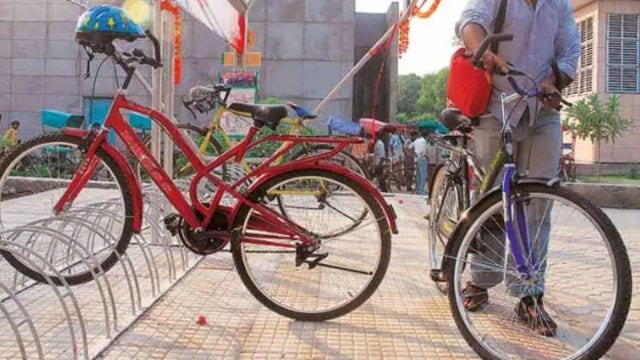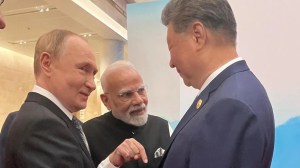GST reform backlash: 13% inverted duty gap leaves Punjab’s core industries in distress
Restructuring of Goods and Services Tax slabs has evoked mixed reactions in Punjab, home to key bicycle, textile, and apparel industries.
 As per the changes, GST on complete bicycles has been slashed from 12 per cent to 5 per cent. (Express Photo)
As per the changes, GST on complete bicycles has been slashed from 12 per cent to 5 per cent. (Express Photo)The Bharatiya Janata Party (BJP) may be celebrating the restructuring of Goods and Services Tax (GST) slabs—reduced to only two rates of 5 per cent and 18 per cent instead of the earlier multiple slabs. But in Punjab, home to key bicycle, textile, and apparel industries, the decision has evoked mixed reactions.
As per the changes, GST on complete bicycles has been slashed from 12 per cent to 5 per cent. However, GST on raw materials like steel and plastic remains at 18 per cent.
“So the gap between purchase of raw material and sale of complete bicycle comes out to be 13 per cent, while earlier it was only 6 per cent. We had been continuously demanding earlier as well to reduce this gap or finish it. But now they have increased the gap further. No doubt this would lead to fall in prices of bicycles for the consumer, but industry can’t survive like this,” said Gurmeet Singh Kular, president of the Federation of Industrial and Commercial Organisation (FICO).
K K Seth, chairman of FICO, added that the inverted duty structure may adversely affect micro and small-scale manufacturers. “While the value addition in bicycles and its parts is only 2–3 per cent, the inverted duty structure creates a 13 per cent deficit of working capital. The greater the production, the higher the deficit becomes, which severely impacts the smaller manufacturers,” he said.
Avtar Singh Bhogal, executive member of FICO, said the federation has requested the GST Council and the Union Finance Minister to bring GST on raw materials, especially steel and plastics, in line with the 5 per cent rate on finished bicycles to ensure real benefit for consumers and manufacturers.
Textile, apparel sector concerned
Punjab’s textile and apparel industry has also raised objections. Sonu Nilibar, president of Punjab Textile Merchants Association, said the new rates would distort the market.
“We have always welcomed GST, but raising the rate to 18 per cent on apparel above ₹2,500 while unstitched fabrics remain at 5 per cent will distort the market. Earlier, readymade clothing priced above ₹1,000 was taxed at 12 per cent, but now garments above ₹2,500 will be at 18 per cent. The gap between unstitched (5%) and stitched (18%) is huge—13%—which will distort the market,” he said.
He further pointed out that handicraft material such as nakshi, dabka, mirror, and thread work on dresses has been reduced to 5 per cent from the earlier 12 per cent. “This disparity is going to add more tax evasion in the market. It will hurt organised retailers, confuse consumers, and benefit the unorganised sector. We urge the government to reconsider and keep a uniform 5 per cent rate for the healthy growth of the textile and apparel industry,” Nilibar added.
Concerns over corruption and bogus billing
Badish Jindal, president of the Federation of Punjab Small Industries Association (FOPSIA), said the inverted duty structure will create additional hurdles for manufacturers.
“This will impact manufacturers as nearly 50 per cent of their capital will get stuck with the GST department, given that the average refund time in Punjab is around four months. It will also increase corruption as the industry will have to pay huge bribes for getting refunds,” Jindal said.
He added that while traders and assemblers will benefit, bogus billing of cycles is expected to increase. “Those involved in such practices will sell invoices of bicycles at zero tax and buy bills by paying 9 per cent GST, thereby earning 4 per cent profit from billing,” he warned.
FOPSIA has demanded either bringing GST on steel down to 5 per cent or automating the refund process with monthly return filing.
Industry sees opportunity
In contrast, the Association of Trade and Industrial Undertakings (ATIU) welcomed the reforms. Its president, Pankaj Sharma, termed the move a “landmark GST reform—a gamechanger for Indian industry”.
“For the first time, the tax system has been simplified into a two-slab structure (5% and 18%), abolishing the earlier 12% and 28% slabs. This move will give a massive boost to local industry, particularly in Ludhiana, which has over one lakh registered MSME units,” he said.
According to Sharma, the key beneficiaries include: auto parts (GST reduced from 28 per cent to 18 per cent); agriculture machinery (12 per cent to 5 per cent); tractors (12 per cent to 5 per cent); bicycles (12 per cent to 5 per cent).
“By slashing GST rates, the reforms will lower prices, stimulate demand, and inject vitality into the Indian economy. These reforms will also formalise the economy and pave the way for India to remain among the world’s fastest-growing economies,” Sharma added.







